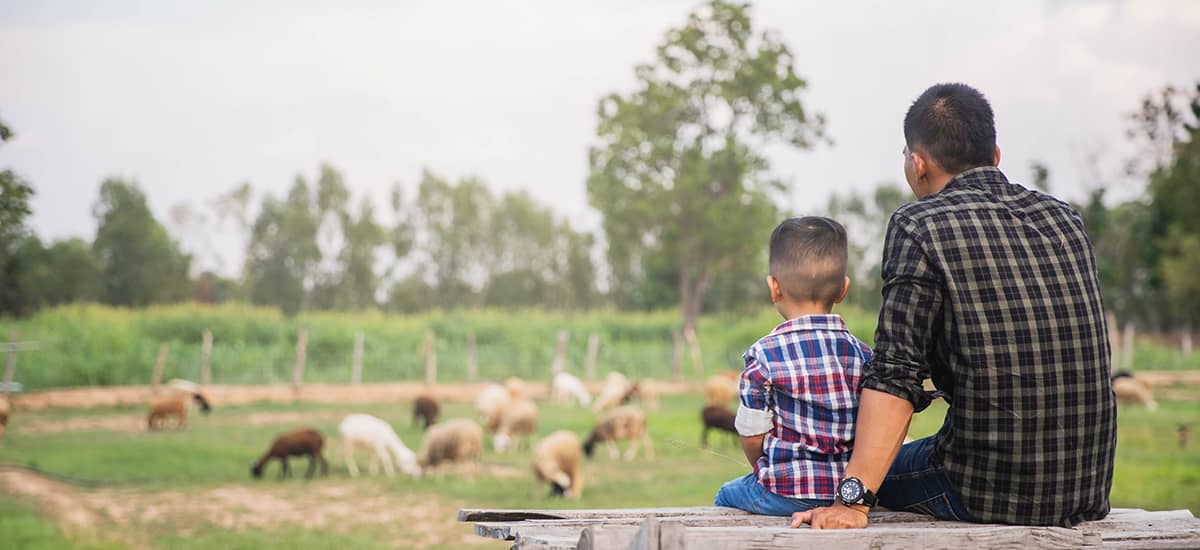
Heavy rainfall and long droughts in many parts of the world have become more frequent and intense with changes in climate. They have caused crops to wither in the field or be washed away, disrupted water supplies, harmed livestock, damaged farm equipment, and upended agricultural infrastructure. Rural families whose livelihoods depend on land and natural resources are the most vulnerable.
Weather-related flooding not only impacts farm production. It also affects children in rural households. Today, more than two-thirds of the 250 million children engaged in child labor globally work in the agricultural sector. Rainfall shocks may cause rural families to pull their children out of school to take on paid work or do chores on the farm to substitute for hired labor. That may smooth the family’s economic problems in the short term, but it can have serious implications over time. The loss of formal education and playtime affects children’s cognitive development and their possibility of long-term, greater earnings, potentially trapping families in cycles of poverty.
Weather Events in Colombia
In a recent paper we studied Colombian data from the past decade to understand the relationship between extreme weather events and family choices affecting children’s wellbeing. We also explored the question of whether financial inclusion could help mitigate any adverse effects on children’s education. The data suggest that financial mechanisms like asset insurance, remittances, and emergency aid can make a significant difference, allowing families to keep their children in school and build their human capital in ways that are promising for their futures.
Colombia is a particularly relevant country for this kind of research. Because of its position on both the Caribbean and Pacific oceans, it is prone to extreme weather events, caused by the El Niño-Southern Oscillation patterns. Periods of heavy rainfall and intense droughts lead this country to be ranked by the Global Climate Risk Index (2012) as the world’s third most affected by weather-related economic losses. In August 2021, for example, heavy rains in the La Mojana region of Colombia’s Caribbean north, caused a dam on the Cauca river to break, affecting more than 165,000 people. Heavy rainfall and flooding since in that region has damaged thousands of hectares of productive land, destroying agricultural crops, livestock and fish farms, and causing economic harm to tens of thousands of families.
We looked at information from a longitudinal survey of Colombian households (ELCA) and matched it with meteorological data from the official Institute of Hydrology, Meteorology and Environmental Studies (IDEAM) to estimate the relationship between extreme weather events and family choices regarding children; more specifically, between weather variability and child labor, chores, and education. We found that rainfall shocks increased the likelihood of child labor by 5 percentage points and of children doing chores by 9 percentage points, while they decreased the probability of a child attending school by 4 percentage points.
Policies to Reduce Child Labor
Mitigating the pressures families face to rely on children as a short-term coping mechanism is essential. Asset insurance can serve as a buffer after rainfall shocks, allowing families the resources to get by without having to pull their children from school. Other policy innovations are needed to make agricultural insurance and temporary loans affordable for rural households. In some cases, governments need to budget special funds for disaster relief in advance or secure commitments from international aid organizations.
Remittances from abroad can also be helpful in easing the income disruptions from weather shocks. In our data, households who receive foreign remittances are less likely to depend on child labor in the aftermath of a rainfall shock. Governments can support this financial mechanism by facilitating migrant access to digital remittance services that offer lower fees, greater convenience and faster transfers.
Credit, on the other hand, can cut both ways. It can ease a family’s way through hard times but also put additional pressure for those families that had prior loans. Our research found that over-indebted households that held more than two formal loans before a rainfall shock hit were more likely to resort to child labor. That may be true even when parents didn’t have to pay school fees, as school-related costs, like transportation, school uniforms, books and supplies, could become unaffordable. Allowances should be made so that the most vulnerable households can restructure debts in the event of extreme weather events that harm their productive and consumption capacity.
The Mitigating Role of Financial Inclusion
Education is one of the most important investments a family can make towards their children’s mental development and long-term economic potential. It is, however, increasingly threatened by weather shocks from intensifying climate change. An important finding from our research is that financial inclusion in rural areas should help mitigate the adverse impacts from those shocks, improving families’ ability to maintain their consumption, protect their savings, and avoid informal mechanisms like child labor at the expense of their children’s education. Efforts to ensure that adults are also educated in the benefits of having and using financial services, like asset insurance and low-cost bank loans, can make a significant difference in safeguarding the education and welfare of the next generation.


Leave a Reply